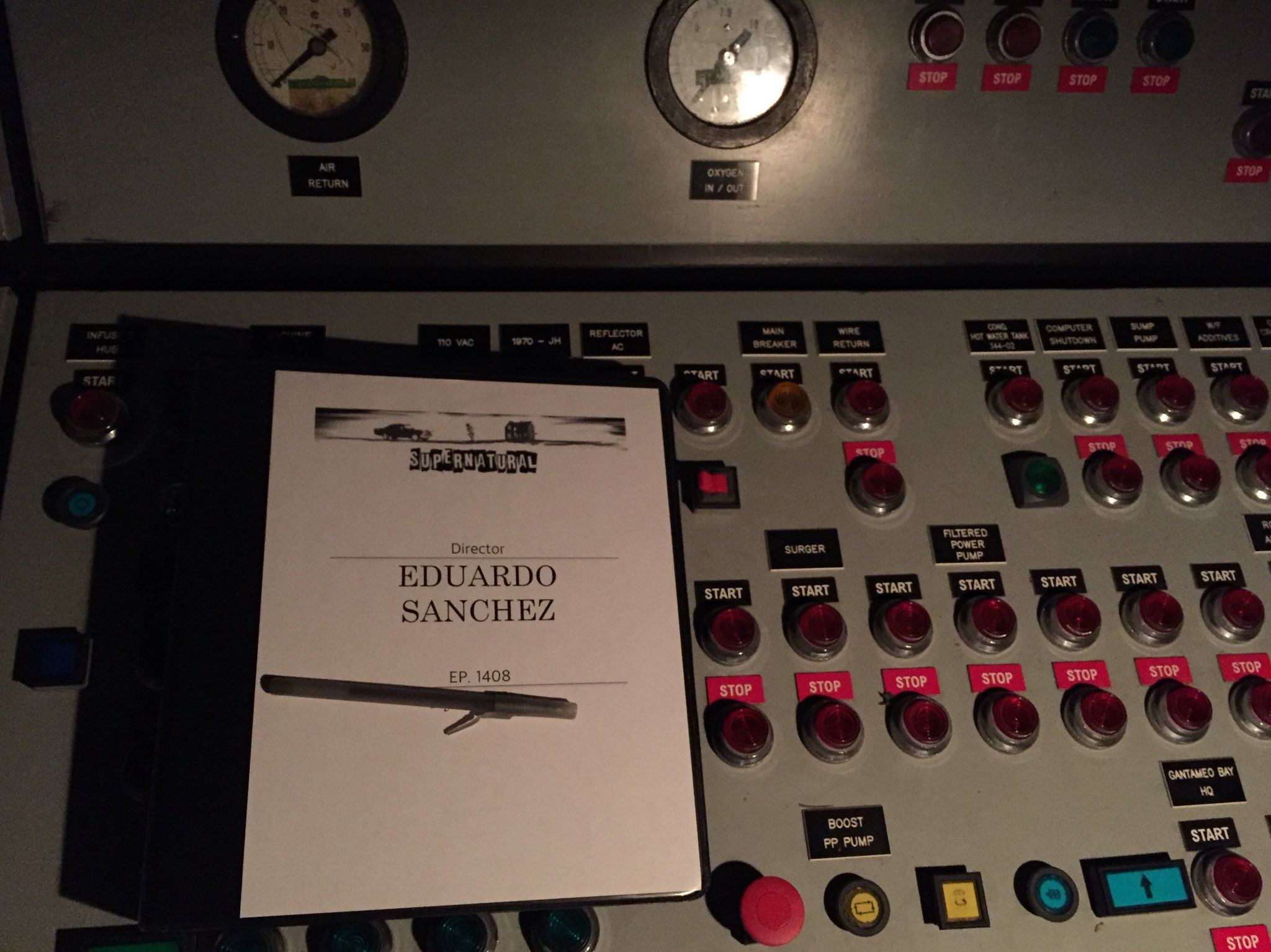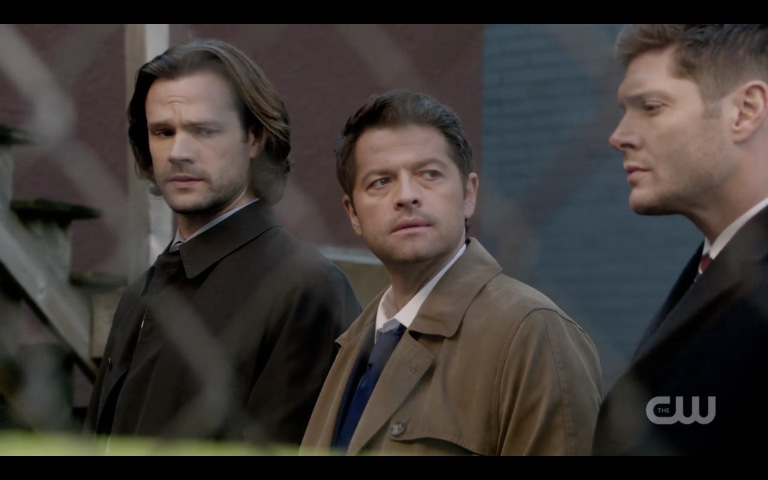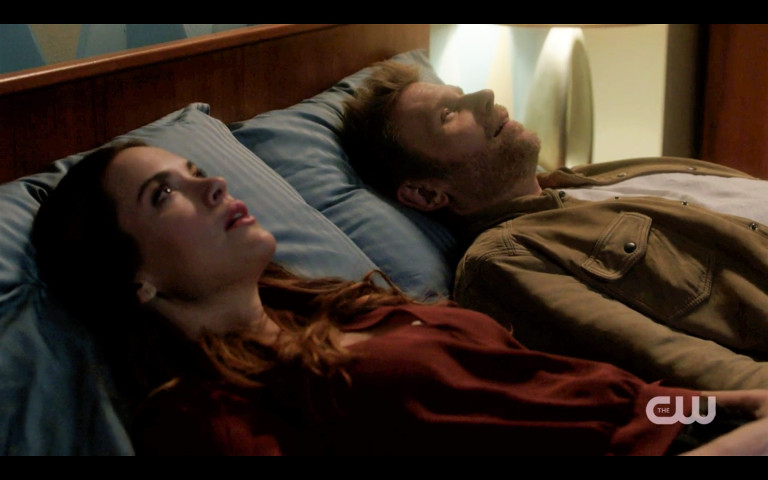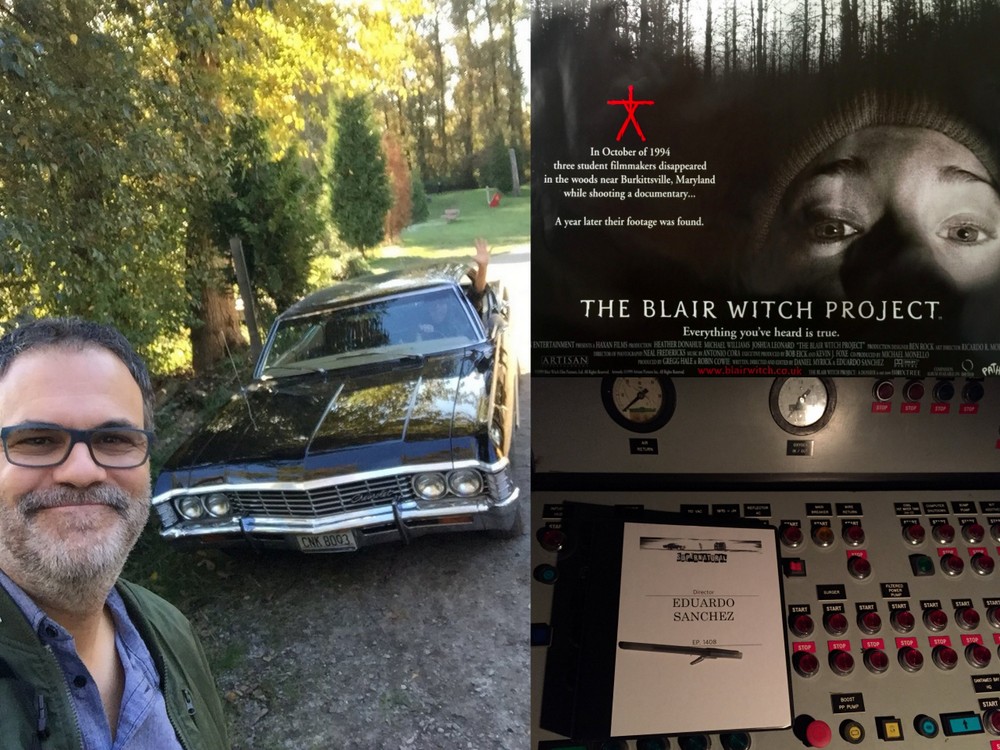
Eduardo Sanchez burst onto the film scene in 1999 with the innovative and terrifying Blair Witch Project. That ending scene in the basement still sends a shiver down my spine! He has gone on to direct in film and television, including my favorite show of all time, Supernatural.
I am fascinated by every aspect of creating a television show or a film that I love because if there’s one thing that has become very clear to me after researching and writing books about Supernatural for over a decade, it’s that Supernatural is a collaboration. It takes top-notch writing, set dec, locations, cinematography, make-up, special effects, producing, acting and directing (among a multitude of other things) to make Supernatural the special thing it is. So I’m always genuinely interested in the perspectives of all the many people who contribute to that collaboration. I loved hearing the actors’ perspectives when they wrote chapters for Family Don’t End With Blood (which you can buy here) and the insights of director of photography Serge Ladouceur in Fan Phenomena Supernatural and all the contributions that everyone on the set shared in Fangasm Supernatural Fangirls. I am endlessly fascinated with what it takes to make a show like Supernatural.
So it was with great anticipation that I scheduled a chat with Sanchez, who has done four episodes of Supernatural so far, not to mention the groundbreaking film The Blair Witch Project. And guess what? Our chat was even more fun and more fascinating than I had anticipated! (And not scary at all). So sit back and relax and enjoy a director’s insights.
Lynn: The first episode of Supernatural that you directed is one of my all-time favorites, The Chitters. That’s partly because it introduces two of my favorite original characters, Jesse and Cesar, affectionately known in the fandom as the “hunter husbands.” Written by Nancy Won, who I wish had stuck around on Supernatural, this episode was groundbreaking in its own quiet way. It was the first time Supernatural told a fully fleshed out story of two gay characters in such an organic and matter-of-fact manner. There were articles after the episode aired praising Supernatural for being “quietly progressive” with an interracial gay couple who are both hunters and heroes. Were you aware that it would be an important episode in that aspect?

LYNN: It just played out so matter of fact. Even in the reveal of the very first scene, Jesse’s sexuality is something you realize slowly instead of a dramatic revelation. And later, when Jesse and Cesar share a beer with Sam and Dean, the realization sort of dawns slowly on Dean that they’re a couple, and his reaction is temporary surprise and then genuine curiosity about what it’s like to settle down with another hunter. That just anchored it in such realism.
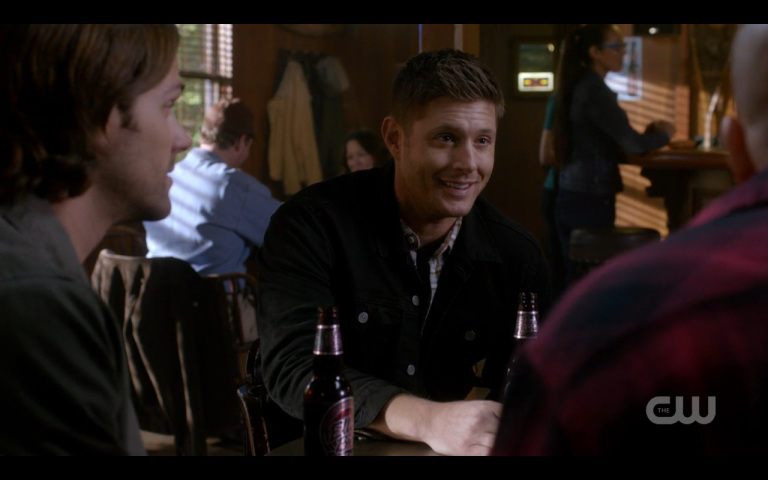
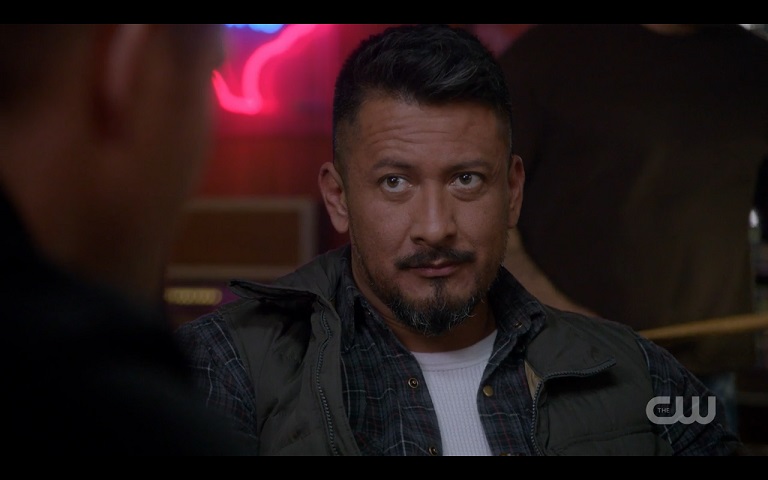
LYNN: Hugo Ateo has said on twitter that Cesar was the first gay character he’s been allowed to play in 25 years. He said, “When I audition for a gay role I’m often deemed ‘not believable as gay’ which of course means ‘not stereotypical enough.’ I hope times are changing.” I think, as a gay man himself, that’s part of why he really appreciated this role – and maybe Supernatural played a small role in that change in this case.
EDUARDO: And honestly I don’t think I even knew that and I never asked, it wasn’t a thing. I just thought he was really good in the role and the two of them had really good chemistry. They felt like a couple, know what I mean? And that’s what I was looking for, so it really felt like these two guys have been together for a while and they have a history. I really appreciate how they brought that to life.
LYNN: Definitely, all of you did. One of the other things I loved about this episode is that it’s an episode full of tension. I write books about Supernatural because I love so much about the show, including that it not only brings the scary and tension, but the emotional and the humor too. That first scene, when the big brother is taken, and the little brother screaming as he runs after him – I was screaming with him in that scene! And later when they went inside the old mine in the dark hunting the monsters by flashlight, finding bodies with monster babies wriggling inside them – and foolishly splitting up! I mean, someone comes up behind Dean, and he decapitates it with a shovel! I was terrified the whole time because I was sure that Cesar or Jesse or both were going to die. How do you create that persistent unrelenting tension, because it was absolutely terrifying.
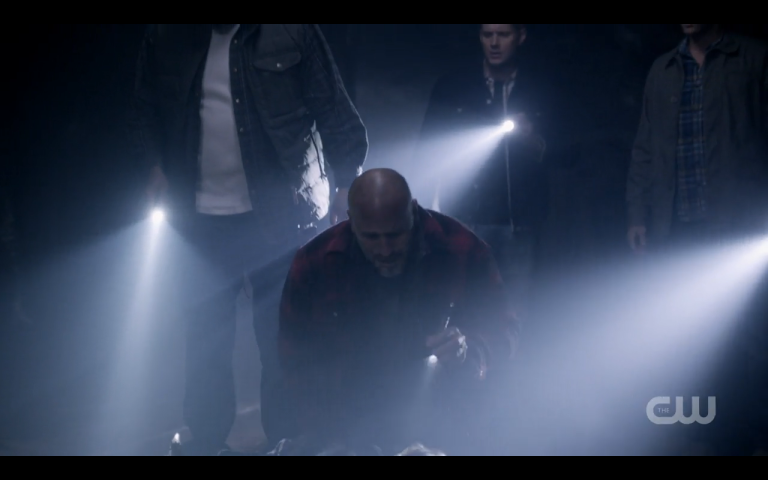
LYNN: Yes!
EDUARDO: So for me it’s about taking the time to kinda build up the tension. Obviously chases are classic, or just going into a scary location, you kinda have like a trial with the characters and the camera has to kind of linger, you know?
LYNN: Mm hmm.
EDUARDO: So I knew that we were trying to bring this scary episode to life, and they kinda let me do what I needed to do. And the editing also, especially when they go into the mine, I kinda held on stuff a little bit longer than they’re used to.
LYNN: Yes! Yes, I can picture scenes where you did that.
EDUARDO: So basically, at least for me, I think of how would I want to introduce this scene? How do I introduce them and then setting up the tension and setting up the danger and the darkness but not giving anything away, kinda holding the details back as much as possible and then slowly doling them out? So it’s kind of a technique that we use and luckily they had the patience to let me bring the pace down in those scenes and linger a little bit. So it ended up being a really nice episode.
LYNN: It did.
EDUARDO: You know, a lot of shows, they have a certain rhythm, and the editors aren’t really allowed to get out of that rhythm. That’s another thing I really love about Supernatural, is that the show changes. It’s not the same episode over and over again. Like you were saying, there’s a lot of emotion, there’s action episodes, there are some that are more emotional and some that are more dramatic. The rhythm of the show changes and that’s what people love about it. So the crew were kinda excited to do a horror episode and appreciated how I brought the episode to life, so it was just a really fun collaboration and a great way to introduce me into that world. I couldn’t have asked for a better first episode.
LYNN: Oh yes, you got a wonderful one. I have a feeling that Jared and Jensen appreciated doing a horror film-like episode too.
EDUARDO: And they’re very open to just about anything, which I think is part of the success of the show. They are just very open to trying new things and going in new directions and they’re not afraid of anything.
LYNN: I get that feeling too. The episode also had a lot of humor, which is another of those ingredients that sets Supernatural apart. One of my favorite scenes ever, and a fandom favorite, is the scene of Dean sitting on the desk teasing Sam about being a sinner and a rebel for smoking weed in college and just enjoying it SO much. How much direction did you give Jared and Jensen in that scene and how much was them just enjoying ribbing each other? Were you laughing when you were directing that?
EDUARDO: I mean, I loved it – you obviously have to be quiet while you’re shooting… (laughing)
LYNN: (laughing) Good point, good point.
EDUARDO: But yeah, every time Jensen would say “sinner,” I couldn’t help but chuckle a little bit, you know?
LYNN: I can imagine!
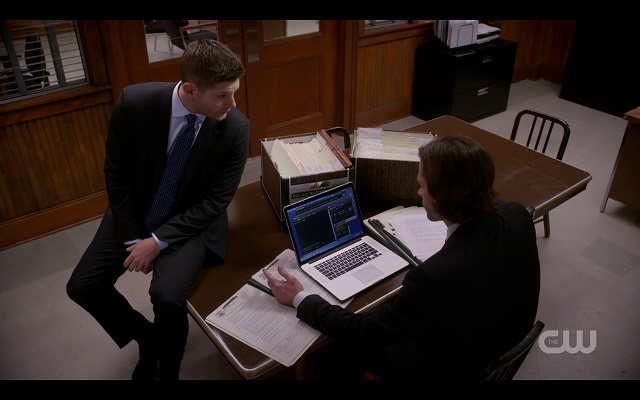
LYNN: Mm hmm. (I have a little game I play where I try to guess what’s adlibbed and then run it by Jensen to see if I’m right – I have a pretty good track record!)
EDUARDO: In that scene, the “sinner” was definitely in the script, but I think I was like, I think you should just keep on like bugging him, you know?
LYNN: (laughing) I have a feeling that was NOT a hardship for them.
EDUARDO: So I think some of the other lines were just like improv and then we put it in. I mean, those guys just have such chemistry. They’re just like – it’s automatic. I call it automatic when it’s like, they just turn it on and they become these characters. And the thing about those guys is that they don’t require a lot of takes – unless they want to try something new – usually, in one or two takes, you can kinda move on because they know their characters so well and the right amount of emotion and the right amount of humor. They know when to play off each other, and just the looks at each other. There’s just so much going on between them that you can’t really capture all of it because they give you so many moments. So when you’re editing the episode, they just give you so many wonderful little moments that there’s a lot to choose from. And that’s also part of what makes the show so special.
LYNN: What a luxury, that you can choose among all those great things! I was surprised when I first watched them film because my only experience with watching filming was being on film sets with Night Shyamalan and watching that, which was a very different pace, taking much longer to film one scene. Was it jarring for you to direct television at first?
EDUARDO: No, because I’d never had the luxury of having a long shoot. All the films I’ve done have been pretty low budget, and you usually have less than 20 days to finish the movie. So it’s always been a fast pace, and when I got into television to me it was kinda a natural progression from indie film to television. You have to do 6, 7, 8 pages a day or you’re not going to make the episode, and the same thing with indie film. If you don’t get that every day, sometimes more – if you have an action scene it’s more whether it’s film or television – but you have to average a certain amount of pages. So the pace for me was right at home. Especially on Supernatural, because the scripts are very fine-tuned and the show itself is like a well-oiled machine.
LYNN: It really is, that’s so obvious when you watch them film.
EDUARDO: I find myself kinda moving through the days really quickly. I love giving them short days when I shoot an episode.
LYNN: Oh they must love you!
EDUARDO: Everyone appreciates that. (laughing). So for me, going from indie to television was pretty easy.
LYNN: The last thing I wanted to say about this episode is that I loved the beautiful cinematography – I think Serge Ladouceur is brilliant, and you are a good team with him. There are some iconic shots of the Impala on Vancouver roads, beautiful shots of Dean and Cesar in the Impala at night, rain on the windows – and the last shot, the Impala driving away with Sam and Dean leaving the two other hunters to retire and all of us wondering if Sam and Dean could make it to the finish line too – the perfect ending shot. I feel like you must be a big fan of Baby like most of us are.
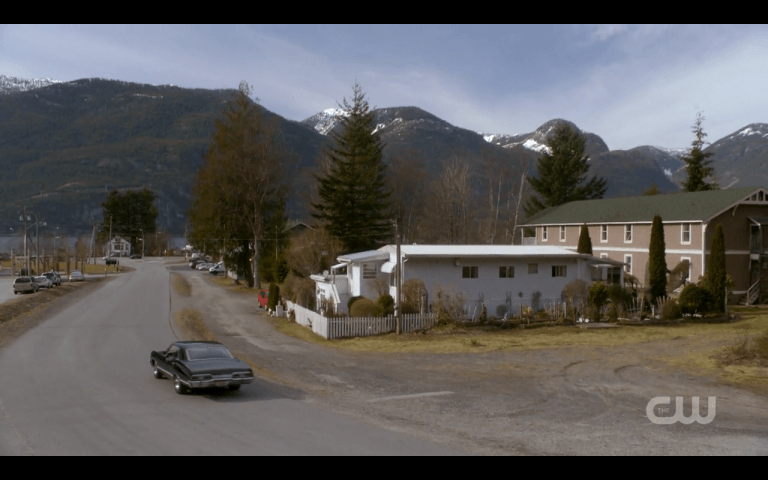
LYNN: Yes, it is.
EDUARDO: So you’ve gotta have some beauty shots. And Serge, of course, is a master. He’s really nice to work with, and I’m always amazed that he’s done just about every single episode.
LYNN: Since the beginning, yeah.
EDUARDO: Very impressive, and he knows how to shoot the car and the show. So for me it was like, stand back and get out of people’s way and just make sure we deliver the goods on the Baby shots because I know the fans expect that.
LYNN: We really appreciated them. And I love Serge – he wrote a chapter for one of our books in fact. So the next episode you did was Rock Never Dies. One of my favorite scenes in that episode, which was written by Robert Berens, is when Sam and Dean are driving to LA and we sort of get to eavesdrop as they’re lampooning LA and making fun of gridlock and botox and sunglasses indoors. Berens said he gave Jared and Jensen a free pass to improvise during this scene, so I’m wondering, what’s it like to direct a scene where they’re improvising and how much did you let them play?
EDUARDO: The thing about improvising is that as long as you follow the path of the scene, especially if you stick the beginning and the end – because you have to connect to the next scene and the previous scene – in between there you can kind of add lines. And they’re great at it. So you just kind of let them go, and usually you get more than you need, and in the editing room you decide which lines you can keep and which you can’t. I remember in that episode, there were a lot of really cool little beats at the end of scenes, like just little interactions and lines. Unfortunately, the problem is that you have a time limit and sometimes you have to keep that in mind. A lot of times those little extra beats, even though they’re funny and they’re my kinda favorite little moments, you have to cut them out. I remember there were a couple we had to get rid of because of timing and to keep the momentum going to the next scene. So yeah, you kinda let them do their thing. They’ve been doing it a while, and they’re so professional, so it’s very easy to let them improv because they know the limits and the rules and they play within the boundaries that you set. So it’s all good. For me, it’s mostly keeping everyone quiet when they make jokes during a take.
LYNN: (laughing)
EDUARDO: There’s a lot of takes where at the end I yell cut and everyone just kind of blows up in laughing.
LYNN: I bet!
EDUARDO: So, you know you’re doing something right – or the guys are doing something right – on set when that happens!
LYNN: When the crew is amused, you know you’re doing something right.
EDUARDO: And it’s a crew that has seen these guys do 230 shows too, so if you’re making them laugh, you’re doing something right.
LYNN: There was also a very emotional scene that I liked in this episode. The last scene was an emotional conversation between the brothers. Sam was losing hope, saying it feels like they’re slowly losing, and Dean jumped in to try to encourage him. He reassured him, saying ‘we will stop him, we will. That’s what we do.’ Jared played this scene very emotionally, Sam with tears in his eyes (so, of course, it made me tear up too). How much of that is your direction, how much was Jared’s reaction, how much was on the page?
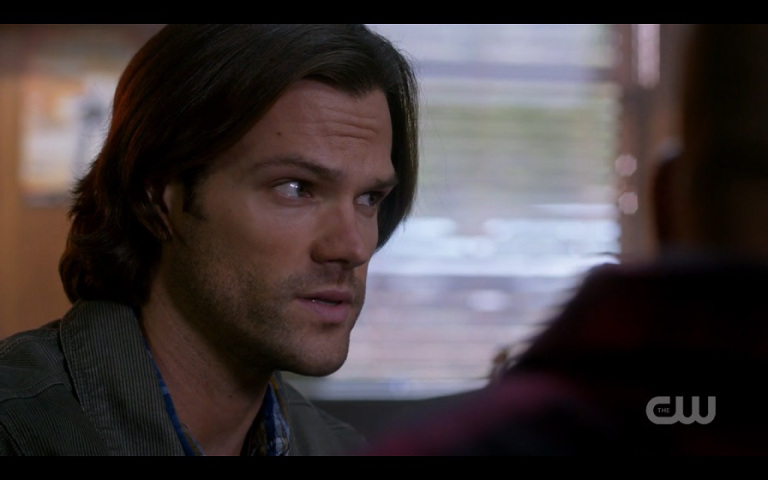
LYNN: Oh yes, yes!
EDUARDO: And I knew that this was gonna be the end, the look back. And that’s the thing about these guys; they’re so good that as soon as I told Jared, he knew exactly what to do. It’s funny you say that about that scene, because it’s one of my favorite things I’ve done on the show, that little beat that we created at the end. So when you have actors who are that talented, it’s very easy because you have so many tools at your disposal. Number one and number two are the biggest – I don’t want to say tools — but they’re like just so talented, it makes it easy to do certain things because you know they can pull it off.
LYNN: I know what you mean.
EDUARDO: It’s never been something like oh, we didn’t get the performance, or oh they’re somehow missing the important part of the scene. They know, and they always deliver, so it’s easy to say hey, let’s do this little beat here, and he just nailed it.
LYNN: It literally brought tears to my eyes even though it was a short scene, that combination of the visuals and the acting. You also got to direct Mark Sheppard and Misha Collins in that scene and they had some great sort of deadpan humor together. There’s that moment when Crowley quips, “Together again,” and Cas just deadpans “Yay.” I laughed out loud at that moment. Misha is so good at that kind of humor – they both are. It was a bit of a different dynamic between Cas and Crowley, more lighthearted than many of their interactions. What was the dynamic like between Mark and Misha?

LYNN: (laughing) They really are that good!
EDUARDO: There are little beats where you kinda say hey, why don’t you do this, and of course there’s blocking and hey why don’t you stand here and then you come into the shot, and we have this little moment, but they are so good, all of them. They’re so good at interacting with each other and they know the characters. They have this kind of hidden language sort of. They read what’s on the page and you kinda set it up and you put them in a good position where they can interact with each other in the scene and then you just let them go and they create magic.
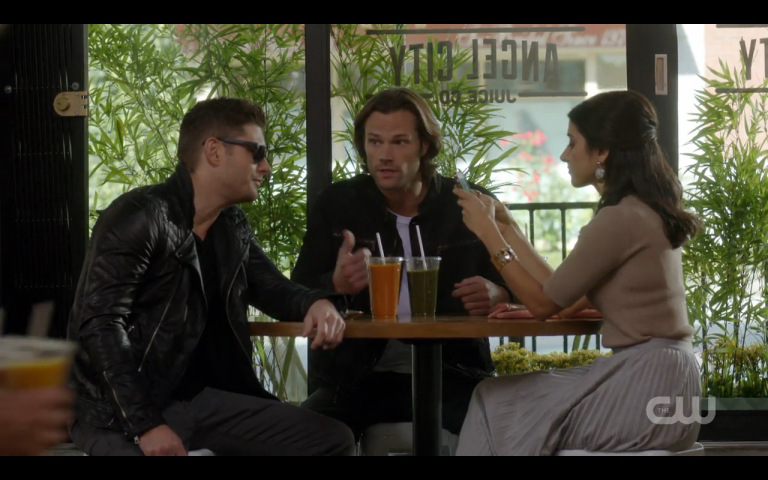
EDUARDO: YES. Absolutely I knew his music. It was funny because my wife is a huge Rick Springfield fan. She grew up idolizing him. We’ve been to a couple of concerts.
LYNN: That’s awesome!
EDUARDO: I definitely like some of his songs, and he’s a talented musician and a talented actor. It was funny because we went to one of his concerts earlier in the year and I knew that I was going to direct an episode of Supernatural later that season. Near the end of the concert, he said hey everyone watch me on Supernatural this season. I’m not sure he said he was playing Lucifer, but everybody cheered, and I was like, I hope I get to work with him, it would be cool to work with him and also maybe my wife Stef could come visit the set.
LYNN: As a fan myself, I really hope she got to!
EDUARDO: She did! And it was funny, Rick was only in a couple of episodes that season and I got the script, and I couldn’t believe my luck. I was like OMG I not only get to work with Rick Springfield, but I get to kill him!
LYNN: (laughing) You did!
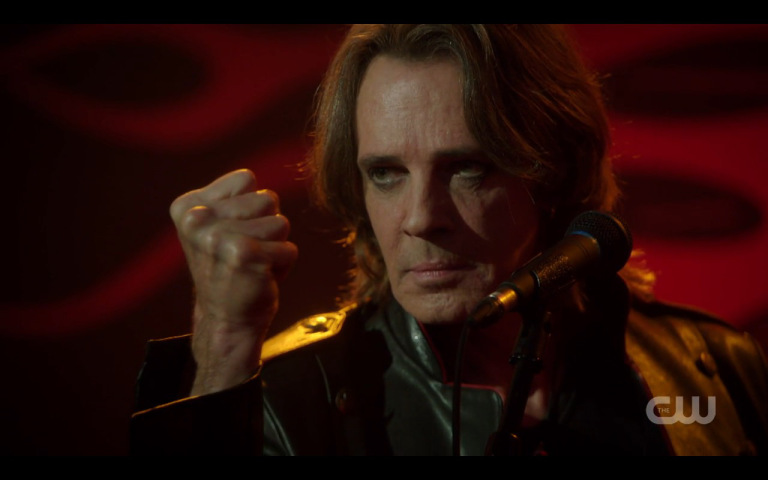
LYNN: That is so perfect. I don’t even know your wife, but I’m so happy for her right now! It’s very interesting too, because that episode is also a bit controversial. It had some dark things to say about celebrity and fandom, sort of a meta-commentary on fame and fans and narcissistic people who use celebrity and power to manipulate. And a bit of derision for fans who can be manipulated through that adoration, like the fan who carved Vince’s name on her chest. And at the same time, positive things are happening in real life around fandom while you’re filming it – your wife is a fan, and that’s awesome and everyone is celebrating the music together. What an interesting juxtaposition.
EDUARDO: Yeah and that’s what I appreciated too. There were some serious themes in that – stardom, being able to manipulate fans, how dangerous that is if it falls into the wrong hands. So it was an interesting thing – and obviously on that show, the guys, everyone appreciates the Supernatural fans so much. I don’t think any other show touches on its fans so much in the show – not only involves them behind the scenes but as part of the episodes, they touch on that. It’s like a world within a world.
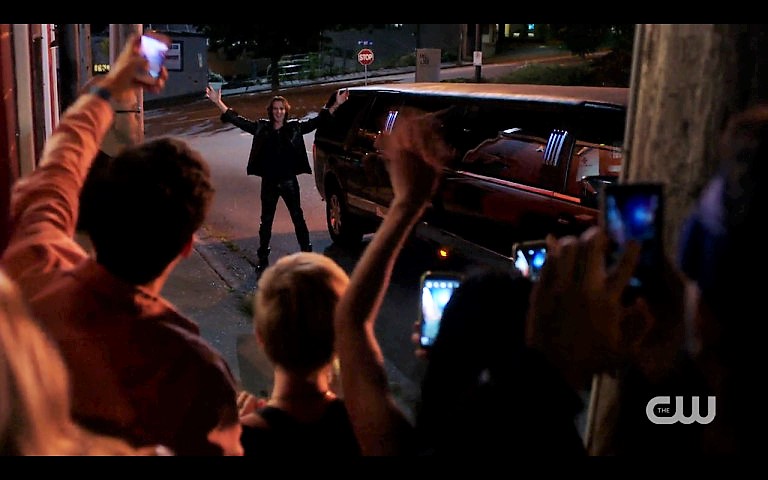
EDUARDO: No, and the thing about them is that they – you’d think that after fourteen years they’d be sick and tired of traveling and doing conventions — but they’re always really enthusiastic about it. I think they really feel appreciative of the fans and realize they have a great life and have done an amazing thing with this show because of the fans. They never forget that.
LYNN: Which is also unusual. So the next episode you did was Devil’s Bargain, which is not one of my favorite episodes. In part, I think that’s because there are so many storylines happening at once and a million characters on the chess board. That’s the writing, not the directing, but it made my head hurt. Lucifer, Asmodeus, Ketch, Sister Jo, Donatello, Gabriel, Sam and Dean, and Cas – all in 42 minutes! Was that difficult to juggle all those characters and story lines?
EDUARDO: Yeah yeah, absolutely. It was definitely the most difficult episode I did. And you bring this new character in who happened to be Jensen’s wife, so it was kinda a special thing. And also, of course, it affected Jensen. He was happy that his wife was around, he was excited, you could tell. And it was also the first time I was working with Mark Pellegrino. I worked with Lucifer earlier, but he was played by Rick Springfield. And Mark is also one of these guys who just brings, even to the smallest little thing, he adds so much to it. So yes, I had a good time, but it was a little scattered for sure. It was a challenge but it was a fun challenge for me.
LYNN: Jensen told me how nervous he was about having Danneel on set – I think caring about how well he did with her there and then also caring about her and wanting her to have a good experience, it added a bit of anxiety for him.
EDUARDO: Yeah, I completely understand that. It’s one thing you being there and being responsible for what’s happening in the show, whether it’s a good or a bad reaction. But once your wife comes in, it’s a different story. I try to be as cool as possible with everybody, and tried to make her feel as welcome as I could and make sure that she got what she needed for every scene. And it was cool, the scene where her and Lucifer, there’s kinda a sex scene…
LYNN: I was gonna ask you about that…
EDUARDO: So I was nervous about that. I’m pretty sure Jensen was not around for that, but you get a little nervous with anything like that. And Supernatural doesn’t really do that.
LYNN: I’d say more people did not like that than liked it, to be honest.
EDUARDO: The thing is, you have to – even though you didn’t like the episode, it is admirable that they try new things and they try to challenge the audience, that’s one of the things that makes the show special. I think if they just gave you the same thing over and over, the show wouldn’t have lasted fourteen seasons. So they kinda made a big deal of it, they were like this isn’t what’s usually done on Supernatural, so they were cautious about it and wanted to make sure it came out right. They had really great chemistry and I thought it was a cool scene, and I liked the little banter that they had afterwards on the bed.
LYNN: Right.
EDUARDO: And I also liked that you kinda saw the sensitive side of Lucifer, the idea of his son and how he felt, just like every father – you know, now I’m gonna screw up my son. It showed, at least for me, a different kind of angle to him that I appreciated. And I think Mark played it perfectly.
LYNN: Yes. it’s one of my favorite Lucifer episodes, because they showed that vulnerability. They sort of took it back by the end of the season, which is a little confusing, but in this episode I did like that. Mark did say that he was glad that Jensen wasn’t on set for that scene, because he was a little nervous!
EDUARDO: (laughing) Absolutely. But they both did a great job, and it didn’t seem like they were nervous at all.
LYNN: They did, they both did a great job. The thing I liked a lot in this episode – which I didn’t hate, I just didn’t love – but I loved the way you brought back Gabriel in the last scene. You took it so slowly, we all held our breath waiting to see who the mysterious figure bent over in his cell was. And the reveal just was so powerful. I literally jumped up off the couch and gasped.
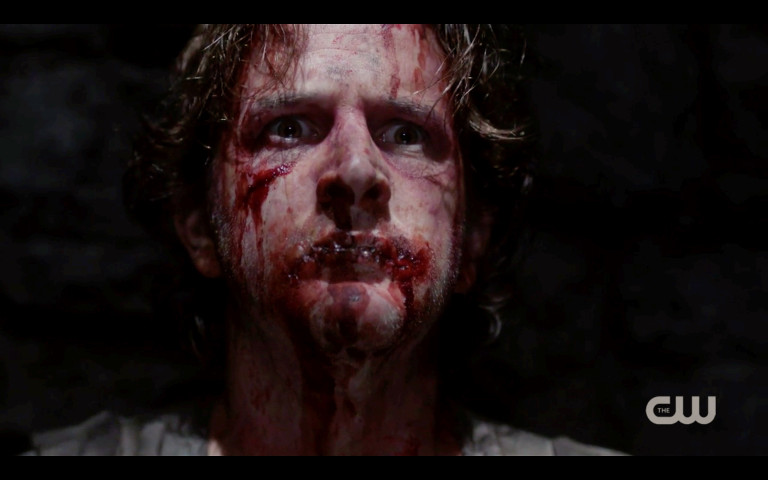
LYNN: Yeah, years.
EDUARDO: Yeah it was really cool to bring him [Richard Speight Jr.] back, even though we only had that one little scene. It was cool to connect that because a lot of people were excited about it – even on set, everyone was excited, it was kinda a big deal. It had to be epic, how else could you reveal something like that?
LYNN: It did, and I really appreciate it when there’s a moment like that, and it’s so important to long-time fans, and you really did it justice. I love that the cast and crew were so excited about Richard coming back too, it’s such a family. So you just filmed an episode for this season, episode 8, is there anything you can tease about that episode? Or if not, how was it different filming your fourth episode of Supernatural compared to your first?
EDUARDO: Well I can’t really give any details…
LYNN: Of course.
EDUARDO: But it’s a really emotional episode. It was the most emotional episode of Supernatural that I’ve done.
LYNN: Oooh
EDUARDO: And it was the first time that I got to work with Jack –
LYNN: Alex.
EDUARDO: Yeah, the first time I worked with Alex, and there were some characters from previous seasons who came back, and it was cool to kinda connect the dots. Obviously a show that’s been on for fourteen seasons, that’s the great thing about Supernatural, it has so many dots that you can connect. Almost every episode has dots that you can connect to seasons past because it has such a history, such a heritage.
LYNN: For sure
EDUARDO: There are some intense scenes in this one, and the guys really did a great job and handled it very well. It’s a fun episode; I think you’re gonna like it.
LYNN: I like the emotional episodes, so I think you’re right.
EDUARDO: Of the ones I’ve done, it ‘s the one that kinda tugs at your heartstrings.
LYNN: I like my heartstrings tugged by this show, so now I’m really looking forward to it. Can I ask a few questions about Blair Witch before we end?
EDUARDO: Sure.
LYNN: It’s interesting, it came out at about the same time as The Sixth Sense, which my son was in, so I was very caught up in that film at the time and missed some of the buzz around Blair Witch. But it was interesting what you did in terms of marketing it like it was real found footage and a website set up with search reports, reactions from their families, etc. And the actors had to stay in character, and I think there was even a time when you really shook the tent they were sleeping in at night to actually scare them. Where did you come up with this idea – it seems so unique. Were you shocked at how popular it became?
EDUARDO: Yeah, absolutely. We were shocked. We knew we had a good idea and every time we pitched it, they were like oh that’s great. But we had no idea what was going to happen with it. It definitely changed as it went forward. The original concept was very different from what was released. A friend of mine, Dan Myrick and I, we were in film school together in the early ‘90s in central Florida. We loved horror movies from when we were kids, even though I’m kinda a scaredy cat, I don’t really like being scared at movies…
LYNN: (laughing)
EDUARDO: So it was kinda this idea we had based on the stuff that scared us when we were kids. It was mostly based on that show we loved in the ‘70s with Leonard Nimoy, In Search Of. We realized that show scared us because it was played as real, even though once we met the guys, they told us that a lot of it was fake or whatever. But the idea of presenting something as a documentary was kinda intriguing to us. We thought, I wonder if you could do that with a modern audience? Obviously times had changed, but Dan and I were both big fans of Orson Welles War of the Worlds.
LYNN: I was just gonna say, that reminds me of that – people heard it on the radio and thought it was really happening.
EDUARDO: Yeah and that really fascinated us, how you could do that. Not that we ever pretended that we were gonna do War of the Worlds and have that kind of impact. But we thought it would be cool to have people go watch the movie – we never thought it would be in theaters, we thought maybe a video release, or a cable channel – the idea of going into this not knowing if it was fake or not and being sucked into it. That was our big thing; we didn’t want anything to give up the fact that it wasn’t real or that the people were actors.
LYNN: Right, not even on IMDb.
EDUARDO: But the movie was going to be more a documentary, showing the footage and then behind the scenes of the investigation, the newscasts and articles and detectives. We were gonna interview – we actually interviewed Heather’s mother, not her real mother, and an ex-girlfriend, people in their lives — so we handled it like if these people really had disappeared, how would you make a film about it? So eventually we realized that the documentary stuff, even though it was compelling, any time you broke away from the footage, it lost its tension. It was almost like a commercial break.
LYNN: That makes sense.
EDUARDO: Even though that information was cool about the legend and where the kids were from and how they met, it lost the momentum. So right before we entered Sundance in 1998, we decided to pull all the secondary documentary footage and just present it as ‘this is the footage that has been found a year after these filmmakers disappeared and this is a documentary.’ And we just let it play, and people really loved it.
LYNN: Well it was kinda marketing brilliance even if wasn’t totally premeditated.
EDUARDO: Yeah we built a website to promote it, and there were people asking questions online at the time about whether it was real. The website treated it like a real documentary, and at the time it was a big website, this was like 1998, so the internet was a fraction of what it is now. Before Facebook and Youtube or anything. The fans, even though they knew it wasn’t real, they loved to play into the make believe aspects of the movie. And then it came out, and we never thought it would be in the theaters, but it made a big splash. It was something that was really unexpected, and I feel very fortunate to have been part of it. It was a great collaboration between us and the actors and the crew. We filmed in Maryland so we used a lot of my friends as the crew. It was like a small family affair, a very low budget movie and an experimental film. There had been fake documentaries, but not like this. We were pretty shocked by how successful it was. It put us on the map and gave me a career and really it’s the reason why I’m talking to you today.
LYNN: It’s funny, there’s such a parallel between it and The Sixth Sense. You were both young, it was low budget, and I don’t know if either film would play out the same way now. I don’t think you could keep the ending of The Sixth Sense, or the murkiness about the reality of Blair Witch, from being discovered today.
[Eduardo shared a funny story about meeting Sixth Sense director Night Shyamalan, who’s a friend of mine, at a party shortly after both films came out. Night said he did Sixth Sense and there hadn’t been a good horror movie out in years, and then “the month before my movie comes out, you guys come out with your movie!” I had to laugh.]
EDUARDO: There was room for both movies obviously. But yeah, you’re right, I think Sixth Sense and Blair Witch were a product of their time. The internet was just big enough to spread the misinformation …
LYNN: But not ruin it
EDUARDO: But not ruin it, yeah.
LYNN: Did you take anything from your experience with The Blair Witch project into the rest of your career, that you use even today with Supernatural?
EDUARDO: Absolutely. Blair Witch taught me – before that, I had done two features, and neither had done anything – so it was like my idea of making a movie centered around my vision and my abilities and me kind of guiding things and making most of the decisions. Blair Witch forced me to give a lot of that control over to the actors. Things that were completely beyond my control. And it taught me that not only actors but the crew – if you find the right crew and actors, because Hitchcock said 99% of directing is casting and he was right. My whole thing, and I use it to this day, is stay out of the way of the people who know their jobs. That doesn’t mean you let them do whatever they want, you guide them, and you have to set the parameters of the scene, the blocking, the basic rules. But for me, you hire a talented crew and actors, and I’m constantly surprised by the things that they bring to the show or to my movies. Things that I never would have brought and would have never come out of my head. So Blair Witch taught me that filmmaking is the most collaborative art in the world and it really does take a full crew. You never know where the brilliant idea is gonna come from, you know?
LYNN: Yes. I do. And that is so relevant for Supernatural.
EDUARDO: So it kinda made me realize you don’t have to be so controlling and micro-managing of the projects I do. It’s been very helpful for me.
LYNN: Are you coming back to Supernatural?
EDUARDO: Not this season, because it’s one of those things that a lot of people want to direct and they have such a history that they have a lot of people to fit in. But I would love to come back and do multiple episodes a season. Phil emailed me the other day and said the episode looks great, thanks for doing it, so I’m hoping that I get to do another one next season. For me, it’s the longest running show I’ve been a part of. I haven’t been doing tv very long, so it’s kinda cool that they bring me back every season. It’s such a joy, and I’ve become friends with a lot of people on the crew and they really do love the show and they love the guys and the guys really love the crew. There’s a reason why this show has gone on for fourteen years – they have something special.
LYNN: They do.
EDUARDO: I just feel super honored to be a part of it and to be able to say I’ve directed four and hopefully five episodes of Supernatural, it’s something I’m always going to be proud of. I hope that as long as they keep doing the show ,they’ll keep bringing me back into the family because it does feel like that. I feel really at home there in Vancouver and the main reason I love Vancouver is because of Supernatural.
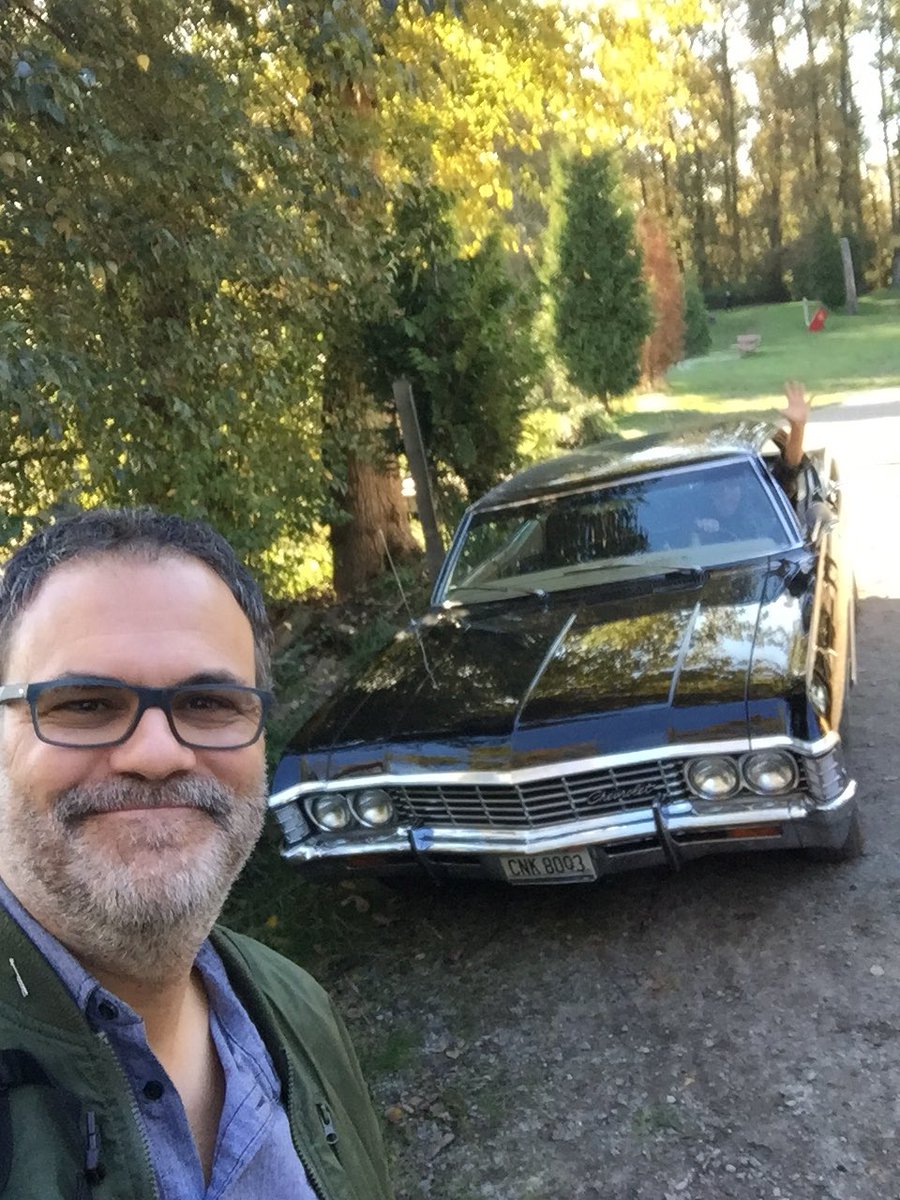
We ended our conversation sharing some East coaster commonalities and hoping for more Supernatural directing in the future.
LYNN: And say hi to your wife, I feel a kinship with her.
EDUARDO: I will – it was definitely a special episode.


